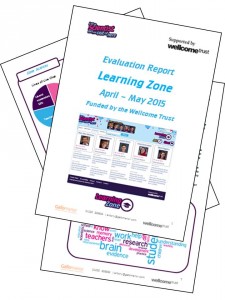In February 2015 we partnered with the Wellcome Trust Education to create the I’m a Scientist Learning Zone.
In the Learning Zone teachers could send questions to and have conversations (thought text based live-chats) with neuroscientists and psychologists involved in research on a broad range of topics around the science of learning.
The Learning Zone was successful, both teachers and scientists found it a valuable experience.
- We created a conversation between teachers and experts on the science of learning: 40 scientists and almost 300 teachers registered to take part.
- The Learning Zone site was visited by 7,000 users during the event. Pages in the Zone were viewed over 33,000 times.
- Scientists and teachers valued the event. 89% of teachers and 94% of scientists would participate again.
- Teachers improved their knowledge about the brain and learning. 66% of the teachers agreed that “their understanding about the brain and/or learning had improved”.
- Improving knowledge may not lead to more confidence or enable more informed decision-making. Before taking part 73% of teachers strongly agreed that “Understanding more about the brain & learning will allow you to make more informed decisions about teaching” – yet afterwards only 36% agreed that they could take more informed decisions.
- The Learning Zone bridged the gap between scientists research and teachers. 77% of scientists agreed that they have a better understanding of teachers’ needs after taking part.
This being our first I’m a Scientist event specifically for teachers, we think we still can improve certain aspects of it:
- Increase the variety of live chat the schedule. There were 2 live chats per week: Monday 8pm and Wednesday 4pm. This schedule remained constant to create familiarity with the timings, however it meant that teachers and scientists who were available at other times were restricted from taking part in the live chats.
- Add themes to the Learning Zone. Consider theming certain weeks around specific topics, while leaving other weeks with a general “science learning” theme.
You can download the full report here.


